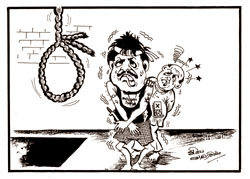|

Capital punishment - not the best solution
Ramina T. Fernando, USA
SOLUTION: Capital punishment is a solution to deal with
criminals in society, but it is an easy one. Is this the best solution
the human mind can think of?
In a Buddhist country such as Sri Lanka, non-violence, even in the
face of the most hideous of crimes, should be applied. This should mean
to the end of capital punishment in its absolute form.
 Countries and persons, who practise the killing and torture of its
criminals, create only band-aid solutions to their problems in society,
and an illusionary vision to the successes of their countries. Rather
than resort to such detrimental and violent acts towards criminals,
governments should put more emphasis finding solutions to their national
ills through non-violence. Countries and persons, who practise the killing and torture of its
criminals, create only band-aid solutions to their problems in society,
and an illusionary vision to the successes of their countries. Rather
than resort to such detrimental and violent acts towards criminals,
governments should put more emphasis finding solutions to their national
ills through non-violence.
In terms of national welfare, capital punishment creates an easy-fix
solution, serving the wants and prestige of those mostly in power and
control. Consider crucifixion which was the approved mode of punishment
during the rule of the Romans.
This common form of punishment was meted out to insurrectionists,
murderers, thieves, and almost any kind of criminal act. This certainly
kept the power and glory of the Roman emperors ongoing for 2000 years.
So hideous was this that the religion of Christianity was born out of
the emotional trauma people underwent during this era.
It was widely accepted as the rule of law, but in this age, we
shudder at the horror of such persecutions.
The end of capital punishment would mean that human thought would be
better put into helping fellow man through the troubles and tribulations
of life. It would mean that man would use his intellect to solve to his
nation's ills, and find more constructive ways in dealing with the
criminal mind.
This wave of thought will force humans to rewrite their code of
ethics governing them, forcing them to give thought to healthier
solutions on how their societies should interact.
Even in the face of the most violent of acts upon a loved one, if
there was no thought process towards retribution and violence to the
offender, the victim will maximize this time of mourning to seek
consolation in forgiveness, acceptance, and reconciliation.
Revenge for such crimes will never be considered, as then the victim
would find it unethical.
This should be a constant and ongoing mission, and though some may
view it as a 'soft' solution, it will eventually, however slowly, give
rise to a more civilized world. A perfect solution using this kind of
philosophy will not be apparent in an instant, but gradually it will
give rise to what the most famous leaders of the world preached about -
we will then be moving towards enlightenment.
#################
Death penalty must be implemented in the interest of peace, harmony
and happiness
S. T. Arasu
 Punishment: Let me express frankly on the current topic and I
am afraid, whether I am right, or wrong here in saying my humble views!
What a pity and shame that rape, child abuse, drug trafficking and
murder are rapidly, on the increase in recent times than before, and no
worthwhile action, has been taken so far, by the State, to arrest those
involved in these deadly, violent crimes? Punishment: Let me express frankly on the current topic and I
am afraid, whether I am right, or wrong here in saying my humble views!
What a pity and shame that rape, child abuse, drug trafficking and
murder are rapidly, on the increase in recent times than before, and no
worthwhile action, has been taken so far, by the State, to arrest those
involved in these deadly, violent crimes?
At present, the punishment is not acting as a deterrent, because
those involved in these horrifying, heinous crimes are aware fully, that
though he, or she is sentenced to death, or life-imprisonment, they will
be back soon (on mercy), after a short-term of prison life, which is
normally reduced for the excellent record of behaviour in conduct, while
in prison.
Yes, he or she attempts to kill somebody, or engage in other crimes
mentioned above, still to be repeated or continued, once again, as the
thought of dying, at the end of a rope, is undoubtedly, a wishful
thinking!
Without any doubt, it is fair and justifiable and it is not sin to
punish the offending culprits, who have committed cold blooded deadly
crimes and also the horrifying heinous crimes stated above! Forgiveness,
mercy and pardon are only good for the reform and rehabilitation of
light offenders but not at all for the unscrupulous, ruthless, deadly,
horrifying, violent crimes, indeed!
It's high time that the higher authorities and our Minister of
Justice, give very serious thoughts to the implementation of capital
punishment whoever who deserves in our country, in the interest of
peace, harmony and happiness of the common man!
If there is a pressure, from various quarters and opposition for the
needed capital punishment, a proper referendum could be held, for all
the citizens to extend their verdict or decision.
#################
Should death be the penalty for rape, child abuse and drug
trafficking?
The question whether capital punishment should be part of the
criminal law of a country has always been a cause of debate in the
world. In Sri Lanka too, where death penalty is recognised in the letter
of the law, but is not effected, its implementation has often created a
stir whenever the subject surfaced in public debate.
This has been the case especially in the aftermath of crimes that
shocked the conscience of the people, with the majority of ordinary
masses pressing for the execution of the culprits, and international and
local human right groups opposing it.
The subject for 'Daily News Debate' this month however, is not
whether capital punishment is desirable or whether it should be
implemented in Sri Lanka. Instead we propose to draw your attention to
three grave crimes that are widespread in our country- rape, child abuse
and drug trafficking, and invite your views as to whether the
perpetrators of these offences also deserve to be punished with death.
Under the Sri Lankan Penal Code, two offences are said to invoke the
punishment of death - murder and waging war against the State. But, are
these the only offences that should warrant death penalty, or are there
other equally, if not more, heinous crimes that call for the ultimate
punishment?
For instance, one could fairly question as to why the above-mentioned
offences of rape, child abuse and drug trafficking ought not to be
countered with the death penalty, given the horrendous nature of these
crimes and the impact they have on the victims as well as the society as
a whole.
Take the case of a rape victim for example. Not only is a woman
subjected to rape physically defiled and burdened with a possible
unwanted pregnancy, the horrifying nature of the crime leaves a lasting
trauma in the mind of the victim, and often destroys her future life in
the backdrop of the social stigma attached to such persons.
The fate of a child subjected to sexual abuse by an adult is no
better. In fact, the mental distress and other effects of the crime are
often more grave on a victim of child abuse owing to his/her tender age,
and could obscure all future prospects of its innocent childhood.
Studies have shown that in a majority of child abuse cases in Sri
Lanka, the offender is a close relative or friend of the victim. This
only aggravates the effect of the crime and, as psychologists have
pointed out, could result in the child growing up into an adult with
violent tendencies.
Although lacking the immediate horror attached with rape or child
abuse, drug trafficking is considered by many among us as another crime
having a similar destructive effects particularly on our younger
generation. Moreover, unlike most criminal acts, the consequences of
drug trafficking are not confined to one or few particular victims, but
takes its toll on thousands of lives.
Given this grave nature of these offences, one is justified in
questioning whether it is fair to let the perpetrators of these crimes
get away with a mere term of imprisonment while they have caused
irreparable damage to the lives of their victims.
In fact, examples of death penalty acting as a successful deterrent
for would be criminals of such offences can be gathered from many
Middle-Eastern as well as Western countries.
However, on the other hand, one could also argue that introducing
capital punishment even for a limited number of offences like rape,
child abuse and drug trafficking is against the tenets of all religions
which advocate forgiveness, and violates the right to life which is
recognised in all international human rights instruments. After all, we
have long passed that age of vendetta where one claimed 'an eye for an
eye', haven't we?
Moreover, given that even judges are fallible being human beings, who
could guarantee against miscarriages of justice all the time, and ensure
that the person punished with death is always the person who actually
committed the crime he or she is accused of?
The 'Daily News Debate' is your forum. So, have your free say on the
above issues. The topic for the coming month is 'Should death be the
penalty for rape, child abuse and drug trafficking?' Send in your views
to 'Daily News Debate', Daily News, Associated Newspapers of Ceylon
Limited, PO Box 1217, Colombo, or via e-mail to [email protected]
before April 15, 2007.
#####################
The Court is bound to decide on the verdict
D. A. Sathischandra
OFFENCE: The criminal law of Sri Lanka stipulates death
penalty for murder and waging war against the State. The three offences
identified: rape, child abuse and drug trafficking have far-reaching
consequences to the victims and the society at large.
Some of the consequences of these offences are both short-term and
long-term and even cumulative as in the case of drug trafficking. Rape
can result in unwanted pregnancy, trauma, social stigma, social
exclusion and uncertain future as identified by the Daily News and other
unidentified impacts.
The impacts of child abuse include, destruction of childhood
innocence, damage to their fun-loving adventurous nature, intrusion into
their innocent and carefree life and trauma. The impact will vary
according to the age of the victims.
It is also difficult to comprehend the impact of the abuse on the
developing child with certainty. Drug trafficking is a serious problem
of a different nature. Depending on the extent of its incidence, its
impact can be varied and intractable.
The direct impact, of course, is drug addiction by the younger
generation in particular. The consequences which follow affect various
fields of society. Drug addiction adversely affects the younger
generation in all the four domains of human development, physical,
cognitive, affective and social shortcomings in the development of the
young can seriously impair their usefulness as future citizens.
Impacts on the physical and mental health of our future citizens
could be serious. Incidence of a variety of diseases could increase,
including infectious diseases such as AIDS, venereal diseases and
tuberculosis. AIDS in particular could attain epidemic proportions. Drug
addiction could also lead to various crimes. In the economic front
productivity would be affected.
It is evident from the foregoing facts that the issue under debate is
a highly complex and involved one. The issue can be discussed at the
fundamental, practical and empirical levels. It can also be analysed and
discussed from various perspectives. We can only give justice to the
issue by indepth analysis from various angles.
In business management literature, experts refer to the tyranny of
'or' which pushes people to believe that things must be either A or B,
but not both. We need to extricate ourselves from this view to have a
meaningful debate.
At the fundamental level society accepts the idea of responsibility
for one's action. Without it social relations would be very different
and it would be difficult to hold a free society together. Capital
punishment is based on this idea of responsibility for one's action.
At the practical level there are various rights which a democratic
society seeks to observe; democratic rights, human rights, women's
rights, children's rights, freedom of speech and expression and so
forth. All these rights flow from the concepts of free will and
liberalism.
These rights need to be enjoyed with a deep sense of responsibility
and duty. For each group to enjoy its rights other groups need to enjoy
its rights other groups need to enjoy their rights with responsibility.
On the capital punishment issue human rights watch groups adopt a
rigid position and do not accept the need for trade-offs to ensure all
groups to enjoy their rights.
Modern society is highly complex and problems that arise cannot be
solved by taking rigid positions. Give and take, compromise, trade-offs
become essential elements of conflict resolution in a society. Now
acceptance of such elements affects stability, social cohesion, growth
and prosperity of a nation.
The empirical level contemporary realities have also to be considered
in the decision-making process. The emphasis on human rights should not
deter us from identifying and understanding the short-term and long-term
implications of rape, child abuse and drug trafficking.
There are two methods of dealing with such problems, namely,
prevention and cure. In devising measures to be taken under each of
these aspects, local realities have to be taken into consideration.
The level of development of the political economic, social and other
conditions of the country needs to be considered, in addition to the
current situation in the country characterised by the ethnic conflict,
increasing crimes, increased underworld activity and proliferation of
small arms. Rigid advocacy against capital punishment ignoring current
realities is unrealistic.
In the current situation the state has to focus on both prevention
and cure. If the current situation regarding rape, child abuse and drug
trafficking demands capital punishment for prevention, Sri Lanka as a
sovereign independent state should have the option to apply it.
It should be seen as a social necessity because of the need to
protect society from greater evils which would flow from undeterred
greed and lust. When modern neuro science can establish beyond doubt
that the perpetrator of the crime cannot be held responsible for his
action because of his congenital neurological conditions the courts can
consider it and give an appropriate verdict. |

